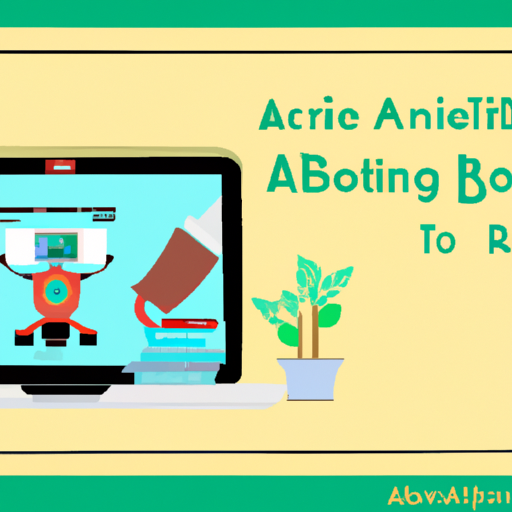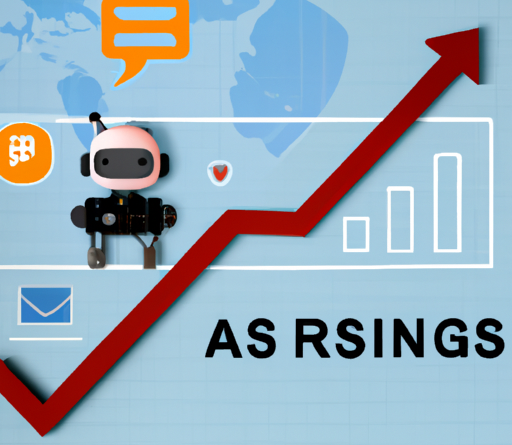
Have you ever wondered how to earn money through blogging with AI and affiliate links? Well, you’re in the right place. This is a comprehensive guide to turn your curiosity into reality. In this friendly walkthrough, you’ll learn how to create blogs on autopilot with your Amazon affiliate links and full product reviews, all thanks to the power of AI and Aiwisemind’s cloud-based auto-blogging software.
When it comes to blogging, some of the most lucrative opportunities lie within affiliate marketing. Affiliate links allow you to earn passive income when someone clicks on your link and makes a purchase. By using these links in your blogs, you can begin to monetize your writing without hassle. Blog creation and updates can be put on autopilot using AI, specifically the Aiwisemind cloud based software. This will give you more time to focus on other aspects of your business.
Creating a blog on autopilot may sound like a difficult task but, with the help of AI and the Aiwisemind software, it’s easier than ever before. Aiwisemind uses intelligent algorithms to create quality content for your blog, which includes affiliate links and full product reviews. This can actually boost your earnings as the combination of great content and affiliate links attracts more readers to your blog.
By the end of our guide, you’ll be ready to put your own blogging on autopilot, equipped with your Amazon affiliate links and thorough product reviews. You’ll be earning money from your blog without breaking a sweat. Just remember, even though it’s automated with AI, the blog is completely yours. So, why not take this opportunity to leverage the power of AI, and start making money from your blog today?
Table of Contents
Understanding the Concept of Blogging
Definition of Blogging
Blogging is the activity of maintaining or updating an online travelogue or journal, also known as a blog. A blog is a platform where you publish individual posts related to specific topics. These posts are usually arranged in reverse chronological order, with the latest post appearing first.
Evolution of Blogging
Blogging has evolved significantly over the years. It began in the late 1990s as a simple way for individuals to share their thoughts and personal passions online. But it quickly grew into a platform for businesses, experts, and influencers to share valuable information and engage with their audience.
Primary Purposes and Benefits of Blogging
The primary purposes of blogging are sharing information, expressing ideas or thoughts, promoting a business, building an online community, and earning a living. The benefits of blogging are multifaceted; it can help you establish your credibility, improve your writing skills, connect with like-minded people, and even earn income through monetization strategies.
Introducing Earning Through Blogging
Monetizing Blogs: An Overview
Monetizing a blog means turning your content into a revenue stream. There are many ways to monetize a blog, including affiliate marketing, sponsored posts, selling products or services, and using advertising programs like Google AdSense.
Ways to Earn through Blogging
The most popular ways to earn through blogging include affiliate marketing, sponsored content, selling your own products or services, and displaying ads. Generally, the right monetization strategy for your blog will depend on your niche and your audience’s interests and needs.
Pros and Cons of Earning through Blogging
Earning through blogging has its pros and cons. The pros include the freedom to work from anywhere, the potential for passive income, and the ability to make money while doing something you love. The cons might include the time it takes to start earning significant income, the unpredictable nature of blogging income, and the need for continuous learning and adaptation.
Exploring Affiliate Marketing
Definition and Examples of Affiliate Marketing
Affiliate marketing is a type of performance-based marketing in which a blogger earns a commission for marketing another company’s products or services. An example of this is when a blogger inserts a link to an Amazon product in their post. If a reader clicks on that link and purchases the product, the blogger earns a commission.
How Affiliate Marketing Works
Affiliate marketing works based on three key elements: the affiliate (the blogger), the merchant (the company selling a product or service), and the consumer (the blog reader). The affiliate promotes the merchant’s product on their blog and earns a commission for every purchase made through their referral link.
Benefits of Using Affiliate Marketing in Blogging
Affiliate marketing offers many benefits to bloggers. It’s a form of passive income, meaning you can earn money even when you’re not working. It’s also flexible; you can choose which products to promote and when. Plus, there’s the potential for significant earnings, especially if you have a large, engaged audience.

Maximizing Amazon Affiliate Links in Blogs
Understanding Amazon Affiliate Program
The Amazon Affiliate Program, also known as Amazon Associates, allows bloggers to earn a commission by advertising Amazon products on their blogs. Affiliates can create links to any product available on Amazon, and earn a referral fee when customers click through the links and make purchases.
How to Incorporate Amazon Affiliate Links in Blogs
To incorporate Amazon affiliate links in your blog, you first need to join the Amazon Associates program. Once approved, you can start browsing Amazon for products relevant to your niche. Using Amazon’s tools, you create affiliate links for these products and embed them in your blog posts.
Effective Strategies to Earn from Amazon Affiliate Links
Effective strategies to earn from Amazon affiliate links include creating product reviews, comparison posts, or gift guides. Also, promoting the affiliate links on social media and optimizing posts for SEO to reach a wider audience can significantly increase the chances of making a sale.
Unleashing the Power of AI in Blogging
Role of AI in the Modern Blogging Landscape
Artificial Intelligence (AI) is revolutionizing the blogging landscape. AI can automate many tasks in the blogging process, such as content creation, SEO optimization, and social media posting. This allows you to streamline your workflow and focus on building your audience and monetizing your blog.
Impact of AI in Content Generation and SEO
AI can generate engaging, optimized content in seconds, save you time, and enhance your productivity. It also plays a significant role in SEO, developing smart strategies that align your content with trending topics, relevant keywords, and high-ranking search results.
Popular AI Tools and Software for Blogging
Popular AI tools and software for blogging include Contentyze, Articoolo, and Frase for content creation; MarketMuse and BrightEdge for SEO; and Hootsuite and Buffer for social media automation.
Using Aiwisemind for Automated Blogging
Introduction to Aiwisemind Cloud-Based Autoblogging Software
Aiwisemind is a cloud-based autoblogging software that uses AI to generate blog content for you. You simply provide it with specific keywords or topics, and it will generate relevant, quality content, insert your affiliate links and publish it on your blog.
How to Setup your Blog with Aiwisemind
Setting up your blog with Aiwisemind is easy. Firstly, you need to register and create an account. Then, you specify your blog’s niche, choose the frequency of posts, and provide your Amazon Affiliate credentials. The software will then create and publish posts on your blog, including your affiliate links, on autopilot.
Maximizing the Features of Aiwisemind for Greater Earnings
To maximize the features of Aiwisemind for greater earnings, you should consistently monitor the performance of your blog posts, and adjust the keywords, posting frequency, and product suggestions based on what works best for your audience. You can also leverage Aiwisemind’s integrations with other services like Google Analytics to get detailed insights into your blog’s performance.

Writing Effective Product Reviews to Boost Earnings
Importance of Product Reviews in Affiliate Marketing
Product reviews play a vital role in affiliate marketing. They provide valuable information to the reader, equip them to make informed purchasing decisions, and enhance your credibility. Most importantly, they drive conversions, increasing the likelihood of a reader clicking on your affiliate link and making a purchase.
Creating Detailed Product Reviews
An effective product review should be detailed, comprehensive, and honest. It should include a clear description of the product, the pros and cons, and a personal verdict or recommendation. Importantly, it should also include your affiliate link, encouraging readers to make a purchase if they found the review useful.
Tips for Effective Product Review Writing
For effective product review writing, focus on the needs of your readers. Understand what they are looking for in a product and tailor your review to those needs. Be honest and unbiased, and include both the positives and negatives of the product. Also, make sure your review is clear, concise, and well-structured.
Strategizing Content Publication
Deciding on Blog Post Frequency
Deciding on the frequency of blog posts depends on a variety of factors including the nature of your blog, the expectations of your audience, and your own capacity. In general, consistency is key. Find a posting frequency that you can maintain consistently, and stick to it.
Benefits of Regular Content Publication
Regular content publication keeps your blog fresh and gives readers a reason to visit regularly. It also improves your blog’s SEO, making it more visible in search engine results.
Using a Content Calendar for Systematic Posting
A content calendar helps you plan your blog posts in advance and publish them systematically. It allows you to balance different types of content, align your content with key dates or events, and ensure that you’re consistently publishing fresh content.
Promoting your Blog and Affiliate Links
Social Media as a Promotion Channel
Social media is a powerful channel for promoting your blog and affiliate links. It allows you to reach a wider audience, drive traffic to your blog, and engage with your followers. You can share your blog posts, promote your affiliate products, and interact with your audience.
Using SEO to Enhance Blog Visibility
Search Engine Optimization (SEO) is crucial to enhancing your blog’s visibility. It involves optimizing your blog posts with relevant keywords so they rank higher in search engine results. It also involves creating quality backlinks, improving your website’s loading speed, and ensuring that your blog is mobile-friendly.
Collaboration and Guest Posting
Collaboration and guest posting are also effective ways to promote your blog. Collaborating with other bloggers or influencers can expose your blog to their audience. Guest posting on other blogs can also increase your visibility and create valuable backlinks.
Monitoring Blog Performance
Understanding and Using Google Analytics
Google Analytics is a free tool that provides insights into your blog’s performance. It helps you understand how users find and interact with your blog, which posts are most popular, and where your traffic is coming from. Use this data to improve your content and promotion strategies.
Measuring Blog Success
There are many ways to measure your blog’s success. It could be the number of visitors, page views, comments, social shares, email subscribers, or revenue. The key is to focus on the metrics that matter most to your blog’s goals.
Boosting Areas of Underperformance
By monitoring your blog’s performance and identifying areas of underperformance, you can strategize on how to boost these areas. This could involve improving the quality of your posts, optimizing your SEO strategies, or enhancing your social media promotion.
Continuous Learning and Upgrading Skills
Staying Updated with Blogging Trends
Blogging is a dynamic field, and it’s crucial to stay updated with the latest trends. This might involve learning about new SEO strategies, content formats, social media platforms, monetization methods, or AI tools.
Learning New Tools and Techniques
Learning new tools and techniques can make your blogging more efficient and effective. This might involve learning to use new content creation tools, SEO tools, social media tools, or analytics tools.
Benefits of Continuous Learning in Blogging
Continuous learning in blogging helps you stay competitive, improve your content and promotion strategies, and adapt to changes in the blogging landscape. It also equips you with the skills needed to maximize your earning potential.
Overcoming Challenges in Blogging
Dealing with Technical Issues
Technical issues are a common challenge in blogging, such as website downtime, loading speed problems, or broken links. The key is to learn basic technical skills or to have a reliable technical support team.
Handling Negative Feedback or Comments
Negative feedback or comments can be discouraging. But they can also provide valuable insights into how you can improve your blog. Listen objectively, respond professionally, and use the feedback to improve.
Overcoming Writer’s Block and Burnout
Writer’s block and burnout are common challenges in blogging. Ideas for overcoming them include taking regular breaks, exploring new topics, and using tools like AI to automate content creation.
Maintaining Ethical Practices in Blogging
Disclosing Affiliate Links
It’s important to disclose your affiliate links to your readers. This not only complies with legal requirements but also enhances your transparency and trustworthiness.
Abiding by Copyright Laws
Make sure you abide by copyright laws. Don’t use others’ content without permission, and always give credit where it’s due.
Maintaining Authenticity and Transparency
Maintain authenticity and transparency in your blogging. Be honest in your reviews, disclose your affiliate links, and be open about your successes and challenges.
Conclusion: Thriving in Blogging with AI and Affiliate Marketing
Revisiting the Benefits of AI and Affiliate Marketing in Blogging
AI and affiliate marketing offer numerous benefits for bloggers. AI can automate many tasks, increasing your efficiency and productivity. Affiliate marketing can provide a steady stream of passive income.
The Future of Blogging: Evolving and Adapting
The future of blogging is likely to involve further evolution and adaptation to new tools and trends. AI will become increasingly influential in content creation, SEO, and promotion. And, affiliate marketing will remain a lucrative monetization method.
Final Tips for Success in Blogging
Finally, to succeed in blogging, stay passionate about your niche, continually learn and adapt, engage with your audience, promote your blog effectively, monitor your performance, and maintain ethical practices. With determination and perseverance, blogging can become more than just a hobby, but a profitable career.









